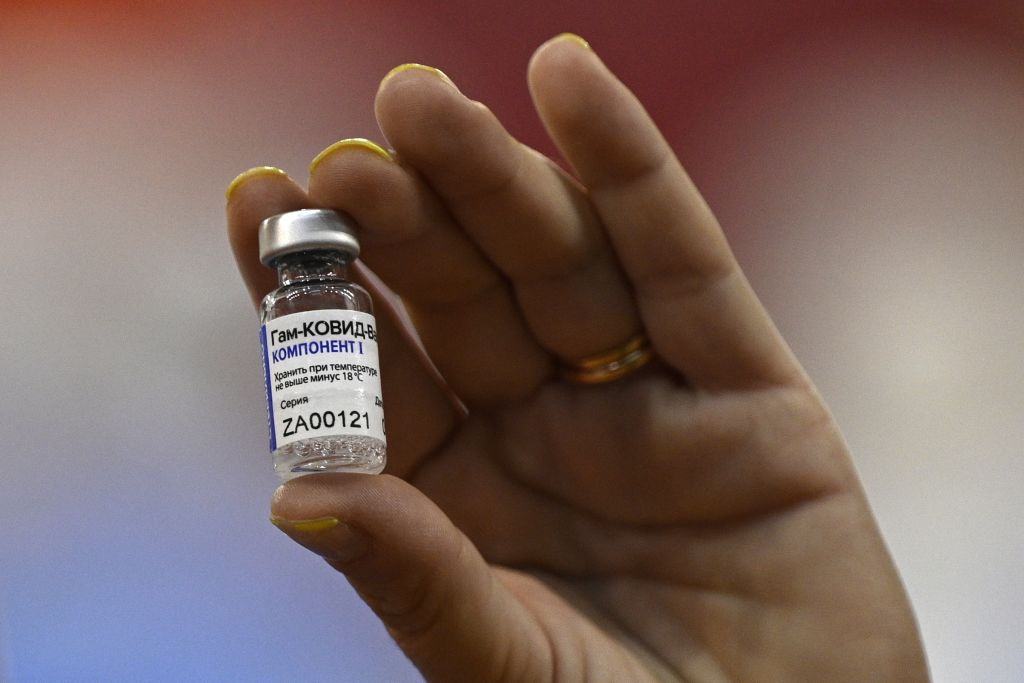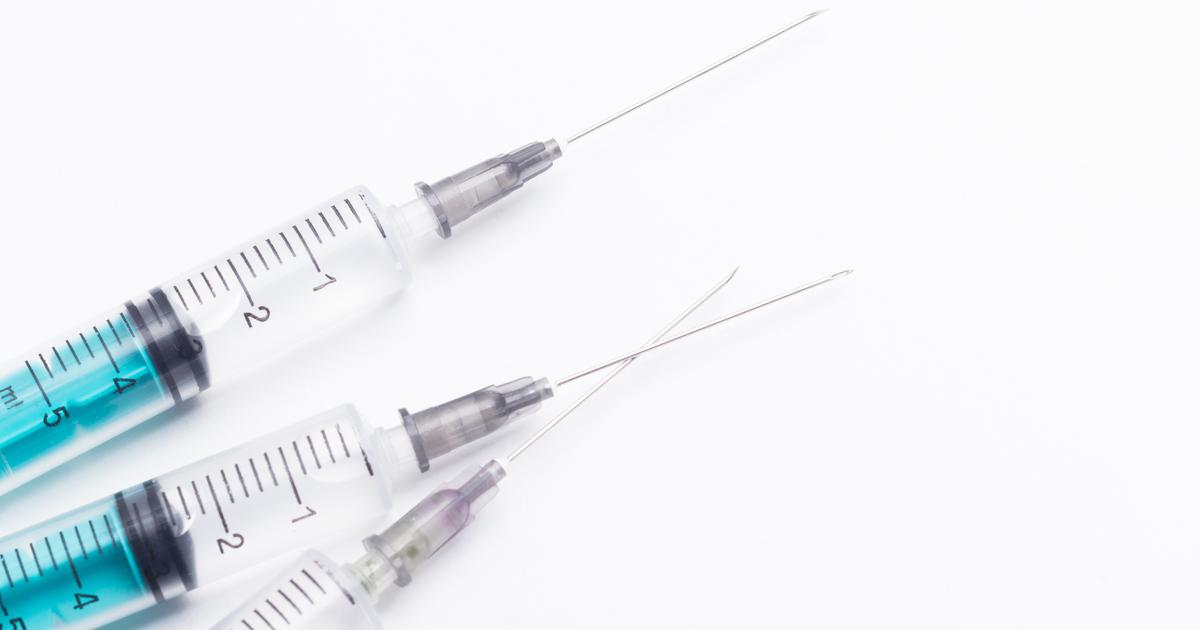A health worker receives a dose of the Sputnik V vaccine against covd-19, on the basketball court of the Argentine club River Plate, under the tribune of the Monumental stadium, in Buenos Aires on February 2, 2020. Credit: JUAN MABROMATA / AFP via Getty Images
(CNN Spanish) -
The race for the development of vaccines against covid-19 is global.
According to the World Health Organization, 240 covid-19 vaccines are currently being developed, although only 63 are in clinical development.
In Latin America, only six countries are conducting clinical trials or planning to participate in one, according to information from December 2020.
Argentina is one of them and has already authorized eight clinical trials of vaccines against the new coronavirus, in addition to 22 clinical studies on drugs.
«The quality of the Argentine health system is very good and Argentina has a tradition of clinical trials.
There are several 'CRO', contract research organizations, which are professional organizations whose mission is to manage clinical trials and which are of recognized international prestige ”, says Luis Ruiz-Avila, executive president of Ruti Inmune, one of the Spanish companies that currently tests in the country.
Although Brazil, Colombia, Chile, Mexico and Peru are also involved in clinical trials of vaccines against covid-19, some specialists highlight several aspects about Argentina.
advertising
MIRA: Argentina, one of the countries with the most registered in the proposal of a month without meat
“It has several advantages: experience in research, a serious regulatory agency, ANMAT, which has the Reference Authority qualification, given by the WHO and PAHO.
If Argentina has something approved, the other countries can also approve it faster, just like we do with the FDA or the European Union.
So it is going to be attractive, above all, for drug and vaccine producers who want to be in Latin America, "says Omar Sued, president of the Argentine Society of Infectology and Director of Research at the Fundación Hupedes.
Currently six phase three studies are being carried out in the country, which is the stage in which researchers seek to confirm the efficacy of the vaccine and its safety on a large scale.
The first one to be approved was that of Pfizer and BioNtech, in July 2020, and which was the most complete, as it included the first three phases of research.
Credit: JUAN MABROMATA / AFP via Getty Images
This was followed, in August and September, respectively, by the authorization for phase three trials of Elea Phoenix, with the Chinese vaccine from Sinopharm, and Johnson & Johnson, with that of Janssen.
Despite the fact that at that time it was announced that the active principle of the AstraZeneca vaccine would be produced in the country for the entire region, it was only at the end of November that its local phase three tests were approved, together with the studies of China's CanSino. Biologics.
The latter, like Janssen's, has the advantage of requiring only one dose.
So far in 2021, two trials have already been authorized: that of Merck, Sharp & Dohme (MSD), which has just been canceled by the laboratory globally after the first results of its investigations were not encouraging, and that of CureVac, with Bayer.
In October 2020, progress was also made with a phase two trial for a Spanish experimental vaccine, Ruti.
Its developers explain that it is a vaccine originally aimed at tuberculosis, which has been studied for more than 10 years.
Although it is not specific for covid-19, they want to test if it could lower the risk of contracting it.
“It is a vaccine that stimulates the body's innate immunity and has the ability to possibly protect the individual against different respiratory germs.
Not only tuberculosis, but other pathogens, including viruses, such as SARS-CoV-2.
It does not compete against the vaccines that are on everyone's lips today, ”explains Dr. Waldo Belloso, infectologist and clinical pharmacologist at the Hospital Italiano de Buenos Aires, who is in charge of the trial in Argentina.
“They can be complementary mechanisms.
In fact, one of the things that we are analyzing, which we are going to analyze in the study that is underway, is the possibility that people who have received both vaccines sequentially, that is, first the Ruti vaccine and then the vaccine specific, could have a greater response to the specific vaccine, both from the point of view of the cells and the antibodies, "adds Belloso.
Experience, volunteers and costs
The Fundación Huiuda, born in the late eighties in response to the spread of HIV in the country, is one of the organizations that conducts more clinical trials on vaccines against the new coronavirus in Argentina.
He participates in the Janssen one, coordinates the Sinopharm one and sponsors and coordinates the CanSino one.
Their experience in the treatment and prevention of HIV has served them well when facing the studies of the new coronavirus.
“We have a lot of experience in vaccines.
We make vaccines since the first years of the HIV epidemic, back in the year 89. We started with the first establishments and we were constantly doing studies.
All the HIV drug studies have been done in Argentina ”, details Sued, who is in charge of the entity's research.
Clinical trials generally last between one and two years, with periodic reviews of participants, which can range from phone calls to more complex controls with swabs and blood tests.
But that seems not to be a complication when it comes to getting volunteers.
For the CanSino vaccine trial alone they seek to recruit 4,000 volunteers, but the number of requests has overwhelmed them.
"We have 20,000 people signed up to receive the vaccine and we will not even be able to answer them," says Sued.
Although there are ample reasons for Argentina to be considered for clinical trials by the world's big pharmaceutical companies, the current economic and health situation makes the country even more attractive.
“Economically it is much cheaper to do research here than in Europe or the United States.
And we are also in a country with a lot of community circulation of covid.
So the possibility of demonstrating an effect in this country is much higher than doing it in Australia, where you have to wait years for people to become infected ”, exemplifies Sued.
Beyond the facilities that Argentina offers, none of the vaccines that are being tested are available to the general public in the country, although some, such as those from Pfizer and AstraZeneca, already have local authorization for emergency use.
At the moment, the only thing that has been confirmed to be available is that of AstraZeneca, whose doses, according to the government and the United Nations' Covax mechanism, will arrive in the coming weeks to join the Russian Sputnik V, which is the the only one currently supplied by Argentina.
Coronavirus Vaccine









